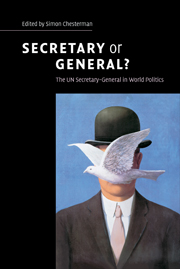Book contents
- Frontmatter
- Contents
- Contributors
- Foreword
- Acknowledgements
- Introduction: secretary or general?
- PART I Defining and refining the job description
- PART II Maintaining peace and security
- PART III Normative and political dilemmas
- PART IV Independence and the future
- 10 The Secretary-General's political space
- 11 The Secretary-General in a unipolar world
- 12 Resolving the contradictions of the office
- APPENDIX: selected documents on the Secretary-General
- Select bibliography
- Index
11 - The Secretary-General in a unipolar world
Published online by Cambridge University Press: 06 January 2010
- Frontmatter
- Contents
- Contributors
- Foreword
- Acknowledgements
- Introduction: secretary or general?
- PART I Defining and refining the job description
- PART II Maintaining peace and security
- PART III Normative and political dilemmas
- PART IV Independence and the future
- 10 The Secretary-General's political space
- 11 The Secretary-General in a unipolar world
- 12 Resolving the contradictions of the office
- APPENDIX: selected documents on the Secretary-General
- Select bibliography
- Index
Summary
The first two post-Cold War Secretaries-General, Boutros Boutros-Ghali and Kofi Annan, had contrasting personalities, management styles, and public personas. Introvert and extrovert, cool and warm, volatile and smooth, calculating and empathetic: their images could not have been more distinct. More than most of their predecessors, however, they shared a reputation as proponents of big ideas, bold doctrines, and a generous interpretation of the scope and authority of the office. And, as Adekeye Adebajo has discussed in chapter 8 of this volume, they shared a native continent. Less propitiously, they both started strong and then ran into serious political difficulties, most pointedly and painfully with the United States. In Boutros-Ghali's case, the Clinton Administration refused, with public disdain and a lonely veto, to support his reappointment to the customary second term. Annan, on the other hand, was the Clinton Administration's favourite to replace Boutros-Ghali and won President George W. Bush's backing for a second term. Washington, however, soured markedly on Annan during his troubled second term, though the Bush Administration did not join the chorus from Capitol Hill calling for his resignation.
Why were these two talented and dedicated leaders unable to sustain US confidence and support? Did the fault lie in the fickle politics and unilateralist instincts of the United States or in the policy choices and public pronouncements of the two Secretaries-General themselves? To what extent did strategic and geopolitical factors drive Washington and Turtle Bay apart once the constraints of the Cold War were lifted? Were these troubles, in other words, just a sign of the times or something that could have been prevented by timely accommodations from one or preferably both sides?
- Type
- Chapter
- Information
- Secretary or General?The UN Secretary-General in World Politics, pp. 202 - 231Publisher: Cambridge University PressPrint publication year: 2007
- 1
- Cited by



